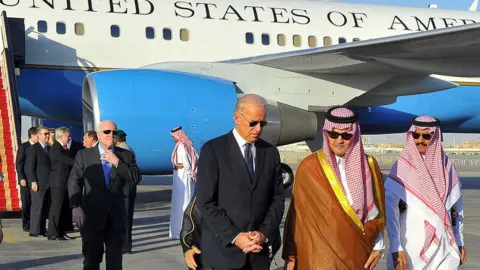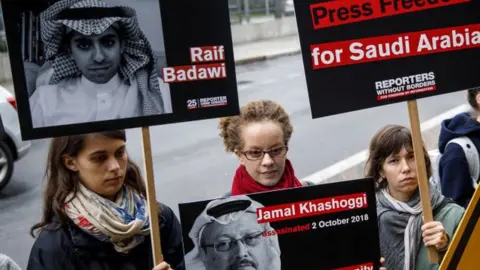Joe Biden to visit Middle East allies amid strains
 Getty Images
Getty ImagesJoe Biden is to visit the Middle East for the first time as US president, with a trip to Israel, the Palestinian territories and Saudi Arabia.
The tour will take place over four days in July.
Relations between the US and its allies have been tested since Mr Biden came to office in January 2021.
The White House has criticised Israeli settlements; Palestinians have urged stronger support; and Saudi ties have frayed over the murder of a journalist.
When he was campaigning for the presidency in 2019, Mr Biden vowed to make Saudi Arabia "the pariah that they are" for killing Jamal Khashoggi.
Khashoggi, a dissident Saudi journalist who wrote for the Washington Post, was murdered by Saudi agents inside the kingdom's consulate in Istanbul, Turkey, in 2018 after he was lured there.
US intelligence agencies concluded that Crown Prince Mohammed bin Salman, Saudi Arabia's de facto ruler, had approved an operation to capture or kill Khashoggi.
The prince denied playing any role and Saudi prosecutors blamed "rogue" agents.
Crown Prince Mohammed had a warm relationship with Mr Biden's predecessor, Donald Trump. But soon after Mr Biden took office, the White House said the new president intended to "recalibrate" the relationship with Saudi Arabia.
However, rising fuel prices have helped convince the Biden administration that this is not a good time to freeze the Saudis out.
The two men will discuss energy production, notes the BBC's Barbara Plett Usher in Washington, although the president has insisted the decision to visit has more to do with security issues than the price of petrol.
It will mark the first face-to-face meeting between Crown Prince Mohammed and President Biden.
"We urge [the Biden] administration to secure genuine progress on human rights before acting in a manner that would bolster the status of the crown prince and his government," they said.
 Getty Images
Getty ImagesA senior administration official said human rights and the war in Yemen, where Saudi-backed government forces have been battling the Iran-aligned rebel Houthi movement since 2015, will be on the agenda.
Mr Biden will make history as a US president by flying directly to Saudi Arabia from Israel - a path rarely allowed by Riyadh, which has no diplomatic relations with Israel. The desert kingdom only recently began to permit Israeli commercial flights en route to the UAE to use its airspace. Crown Prince Mohammed has ruled out following the UAE by normalising its relations with Israel before a settlement between Israel and the Palestinians.
The senior administration official said the trip would partly "focus on Israel's increasing integration into the region".
Mr Biden will hold talks in Israel with Prime Minister Naftali Bennett. Mr Bennett, a right-wing nationalist, is a champion of Israeli settlement-building in the occupied West Bank - something the Biden administration has said it "strongly opposes". Settlements there are considered illegal under international law, though Israel disputes this.
The president will also meet his Palestinian counterpart, Mahmoud Abbas, in the West Bank. The senior administration official said Mr Biden would be "reaffirming his lifelong commitment to a two-state solution" to the Israel-Palestinian conflict - a concept which envisages the creation of a Palestinian state alongside Israel. Mr Bennett has said this is something he would never allow.
The announcement of the visit comes days after the US upgraded its diplomatic ties with the Palestinians, in a move seen as a response to the closure by the Trump administration of the US consulate in Jerusalem in 2018.
Palestinians though have been disappointed by the failure to reopen the consulate, which they considered a de facto embassy. Palestinians were enraged by Mr Trump's 2017 recognition of the whole of Jerusalem as the capital of Israel - a status quo which has remained under the Biden administration.
Palestinians see East Jerusalem as the capital of a future independent state. Israel considers the whole of Jerusalem - including the East, which it occupied in the 1967 Middle East war - as its indivisible capital.
